This article was co-authored by Andrea Rudominer, MD, MPH. Dr. Andrea Rudominer is a board certified Pediatrician and Integrative Medicine Doctor based in the San Francisco Bay Area. Dr. Rudominer has over 15 years of medical care experience and specializes in preventive health care, obesity, adolescent care, ADHD, and culturally competent care. Dr. Rudominer received her MD from the University of California, Davis, and completed a residency at the Lucile Packard Children's Hospital at Stanford University. Dr. Rudominer also has an MPH in Maternal Child Health from the University of California, Berkeley. She is a Member of the American Board of Pediatrics, a Fellow of the American Academy of Pediatrics, a Member and Delegate of the California Medical Association, and a Member of the Santa Clara County Medical Association.
There are 9 references cited in this article, which can be found at the bottom of the page.
wikiHow marks an article as reader-approved once it receives enough positive feedback. In this case, 87% of readers who voted found the article helpful, earning it our reader-approved status.
This article has been viewed 885,206 times.
In addition to being uncomfortable and upsetting, throwing up can cause you to get a sore throat that lingers afterward; however, you do not have to just deal with the discomfort of this type of sore throat. There are a variety of remedies that can be used to treat it quickly and effectively. These include simple solutions, over-the-counter medications, and natural remedies.
Steps
Easing Discomfort with Simple Solutions
-
1Drink water or other clear fluid. Drinking a bit of water after you throw up can ease the discomfort of a sore throat as well as helping you avoid dehydration. The water can help to get rid of excess stomach acid that can coat your throat when you throw up.
- If you still have an upset stomach, drink water slowly and don't drink too much of it. In some cases, filling the stomach with too much water or drinking too quickly can cause you to vomit again. Small sips when the throat pain flares up should do the trick.
- You can also try drinking a little bit of apple juice or another clear fluid.
-
2Drink a warm beverage. If plain water doesn't ease your sore throat, try a warm beverage, such as herbal tea. The warmth of a beverage like tea can really ease the pain of a sore throat when sipped slowly. Make sure you ask your doctor before choosing an herbal tea, especially if you are pregnant, breastfeeding, have diabetes, or heart disease.[1]
- Ginger tea may help ease any lingering nausea and soothe your sore throat, but should not be given to children younger than two.[2] You may also want to try peppermint tea, which can soothe and numb your sore throat. Do not drink peppermint tea if you have GERD or give it to young children.
- Make sure that the beverage is not too hot. A beverage that is too hot when consumed can make sore throat pain worse, not better.
- Try putting honey in your warm beverage. Honey, in addition to the tea, can help to ease a sore throat.[3] Do not give honey to children under 12 months old, however, as this puts them at risk for infant botulism.
Advertisement -
3Gargle with warm salt water. Warm salt water can ease a sore throat that was caused by throwing up. The salt water eases a sore throat by reducing any swelling and reducing symptoms.[4]
- To make a salt water gargle, mix 1 tsp (5 g) of salt in 8 fl oz (240 mL) of warm water.[5]
- Be sure not to swallow the salt water mixture. This can upset your stomach further.
-
4Eat smooth foods. If you have a sore throat from throwing up but you are hungry, smooth foods can both ease your sore throat and fill an empty stomach. A food that does not have scratchy or hard components will be easy on an irritated throat and it can even help to ease a throat irritated by stomach acid.
- Small amounts of foods such as Jello, popsicles, and bananas are all good choices for smooth foods that will ease the pain of a sore throat.[6]
- Be careful when eating after having thrown up, especially if you are still nauseous, as eating too much food could cause you to vomit more. You may be tempted to eat something cool and smooth like yogurt or ice cream, but you should avoid dairy products until you are certain you have finished throwing up.
Using Over-the-Counter Medications
-
1Use sore throat spray. Sore throat spray contains a local anesthetic that will minimize the pain of a sore throat temporarily. Follow the directions on the packaging to know how many sprays you can apply and how often you should apply them.[7]
- These sprays are available at most pharmacies and over-the-counter medication sections in big box and grocery stores.
-
2Suck on a lozenge. Like sore throat sprays, lozenges made to ease sore throats contain a local anesthetic that minimizes the pain of a sore throat. These lozenges come in a variety of flavors and are available at most pharmacies and general stores.[8]
- Like other over-the-counter medications, you need to follow the directions for how often you can use the product.
- A local anesthetic does not eliminate the pain permanently. It will only temporarily relieve it.
-
3Take a pain reliever. Over-the-counter pain relievers can help to eliminate a variety of types of pain, including pain caused by vomiting. However, you need to make sure that the nausea and vomiting episode is over before taking a pain reliever, as this could upset your stomach and cause further discomfort.
- Some pain relievers you can use for sore throat pain include acetaminophen, ibuprofen, and aspirin.
Using Natural Remedies
-
1Check with your doctor first. Though many herbal remedies are safe for most people, do not assume that because something is natural it automatically means it is safe. Herbs can interact with other medications, and some herbs can worsen other medical conditions or may not be safe for certain populations, such as children, pregnant women, and the elderly. Always err on the side of caution and ask your doctor before trying a natural remedy.
-
2Do a licorice root gargle. Licorice root should be simmered in water to create a gargle that will ease your sore throat. Licorice root has been shown to ease the discomfort of a sore throat post anesthesia, so it may work to ease a sore throat that was caused by throwing up as well.[9]
- There are some medications that react with licorice, so check with your doctor if you are on medication for high blood pressure, kidney disease, liver disease, or heart disease.
-
3Drink marshmallow root tea. Marshmallow root tea has no relation to the fluffy white treat. Instead, it is a plant that has medicinal properties, including the ability to soothe a sore throat.
- Marshmallow root tea is usually available at natural food stores and online.
- Marshmallow root can also ease stomach upset, so it may help with the cause of your vomiting, as well as the sore throat after vomiting.
-
4Take slippery elm. Slippery elm coats the throat with a gel-like substance that eases a sore throat. It usually comes as a powder or in lozenge form. If you get the powdered form you will want to mix it with hot water and drink it.[10]
- Women who are pregnant or breastfeeding should not take slippery elm.
Seeking Medical Attention
-
1Know when to contact your doctor. While your vomiting and nausea may pass quickly, there are some situations in which you should contact your doctor. Even a mild case of the flu may become serious if the sick person becomes dehydrated. Call your doctor if you or your child experience the following:[11] [12]
- You are unable to keep down any food or liquid
- You have vomited more than three times in one day
- You received head injury before the vomiting began
- You have not urinated in six to eight hours
- For a child under six: vomiting lasts more than a few hours, they have diarrhea, signs of dehydration, a fever, or they haven't urinated for four to six hours
- For a child over six: vomiting lasts longer than 24 hours, diarrhea combined with vomiting lasts longer than 24 hours, there are any signs of dehydration, fever higher than 101°F (38.3°C), or they haven't urinated for six hours
-
2Know when to call emergency services. In some cases you or your child will need immediate medical attention. Call 911 or your emergency services right away if you or your child experience the following:[13]
- Blood in the vomit (appears bright red or looks like coffee grounds)
- Severe headache or stiff neck
- Lethargy, confusion, or decreased alertness
- Severe abdominal pain
- Rapid breathing or pulse
Food and Drink Ideas
Expert Q&A
-
QuestionWhat's an easy, quick way to fix a sore throat?
 Andrea Rudominer, MD, MPHDr. Andrea Rudominer is a board certified Pediatrician and Integrative Medicine Doctor based in the San Francisco Bay Area. Dr. Rudominer has over 15 years of medical care experience and specializes in preventive health care, obesity, adolescent care, ADHD, and culturally competent care. Dr. Rudominer received her MD from the University of California, Davis, and completed a residency at the Lucile Packard Children's Hospital at Stanford University. Dr. Rudominer also has an MPH in Maternal Child Health from the University of California, Berkeley. She is a Member of the American Board of Pediatrics, a Fellow of the American Academy of Pediatrics, a Member and Delegate of the California Medical Association, and a Member of the Santa Clara County Medical Association.
Andrea Rudominer, MD, MPHDr. Andrea Rudominer is a board certified Pediatrician and Integrative Medicine Doctor based in the San Francisco Bay Area. Dr. Rudominer has over 15 years of medical care experience and specializes in preventive health care, obesity, adolescent care, ADHD, and culturally competent care. Dr. Rudominer received her MD from the University of California, Davis, and completed a residency at the Lucile Packard Children's Hospital at Stanford University. Dr. Rudominer also has an MPH in Maternal Child Health from the University of California, Berkeley. She is a Member of the American Board of Pediatrics, a Fellow of the American Academy of Pediatrics, a Member and Delegate of the California Medical Association, and a Member of the Santa Clara County Medical Association.
Board Certified Pediatrician & Integrative Medicine Doctor You could take a hot shower and just let the steam buildup and soothe your throat, or drink some tea with honey in it. You could also gargle a little salt water to ease your symptoms right away.
You could take a hot shower and just let the steam buildup and soothe your throat, or drink some tea with honey in it. You could also gargle a little salt water to ease your symptoms right away.
References
- ↑ Andrea Rudominer, MD, MPH. Board Certified Pediatrician & Integrative Medicine Doctor. Expert Interview. 13 April 2020.
- ↑ http://www.webmd.com/vitamins-and-supplements/ginger-uses-and-risks#1
- ↑ Andrea Rudominer, MD, MPH. Board Certified Pediatrician & Integrative Medicine Doctor. Expert Interview. 13 April 2020.
- ↑ Andrea Rudominer, MD, MPH. Board Certified Pediatrician & Integrative Medicine Doctor. Expert Interview. 13 April 2020.
- ↑ http://www.mayoclinic.org/diseases-conditions/sore-throat/manage/ptc-20202009
- ↑ https://medlineplus.gov/ency/patientinstructions/000122.htm
- ↑ http://patient.info/medicine/benzydamine-for-sore-mouththroat-difflam
- ↑ http://kidshealth.org/en/parents/sore-throat-sheet.html
- ↑ http://journals.lww.com/anesthesia-analgesia/pages/articleviewer.aspx?year=2009&issue=07000&article=00013&type=Fulltext
About This Article
To treat a sore throat after throwing up, drink plenty of water, which will help soothe your throat and replenish the fluids you lost from vomiting. If your throat is still sore, make yourself a warm herbal tea with honey and sip it slowly. You can also gargle with salt water to reduce the swelling and irritation in your throat. For the rest of the day, eat smooth foods, like banana, Jello, and applesauce to avoid scratching your throat. If your throat still hurts, suck on lozenges, which contain a local anesthetic and help soothe your discomfort. For more tips from our Medical co-author, including when to take your child to the doctor after vomiting, read on!
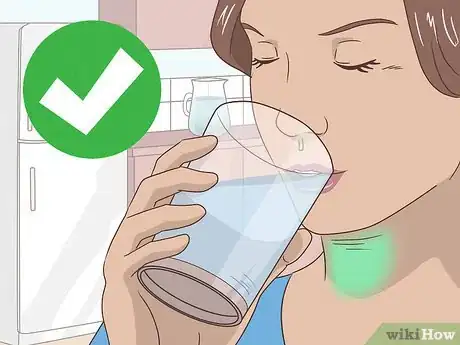


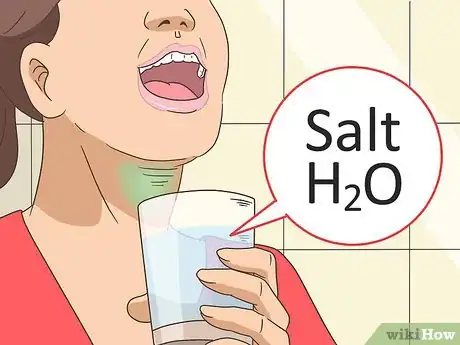

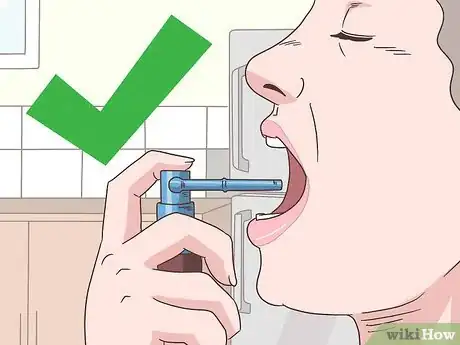
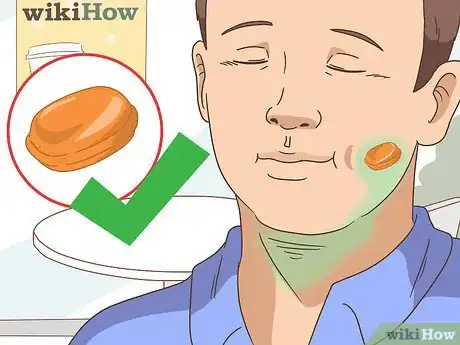
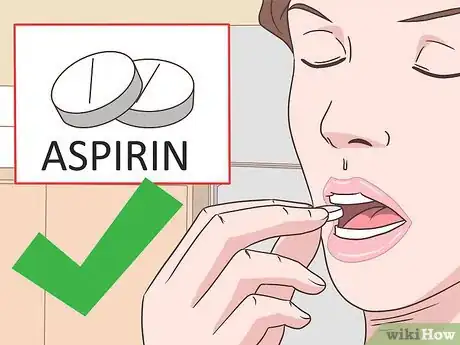


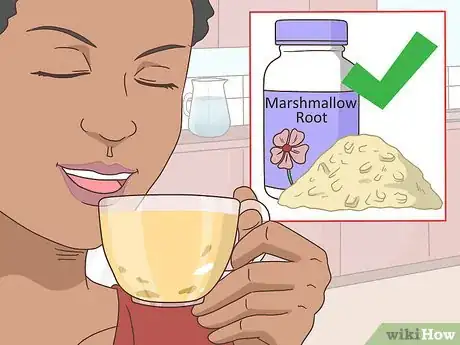

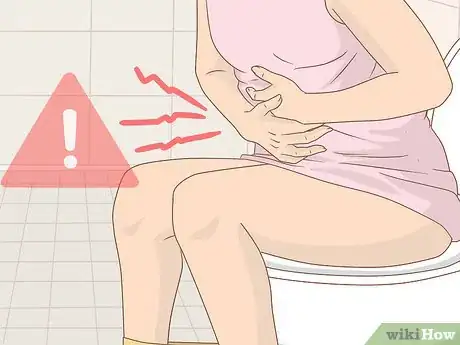
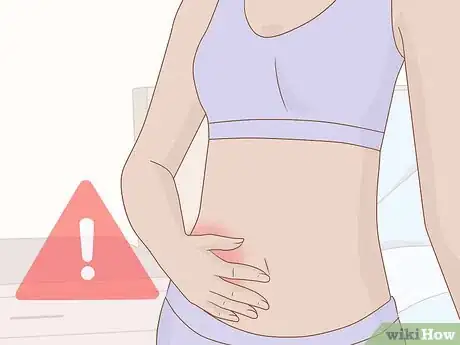




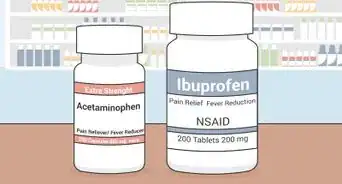

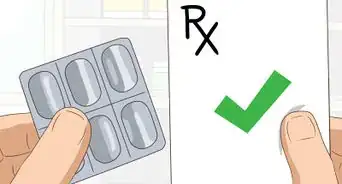

-Step-17.webp)
















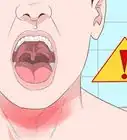

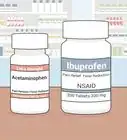



































Medical Disclaimer
The content of this article is not intended to be a substitute for professional medical advice, examination, diagnosis, or treatment. You should always contact your doctor or other qualified healthcare professional before starting, changing, or stopping any kind of health treatment.
Read More...